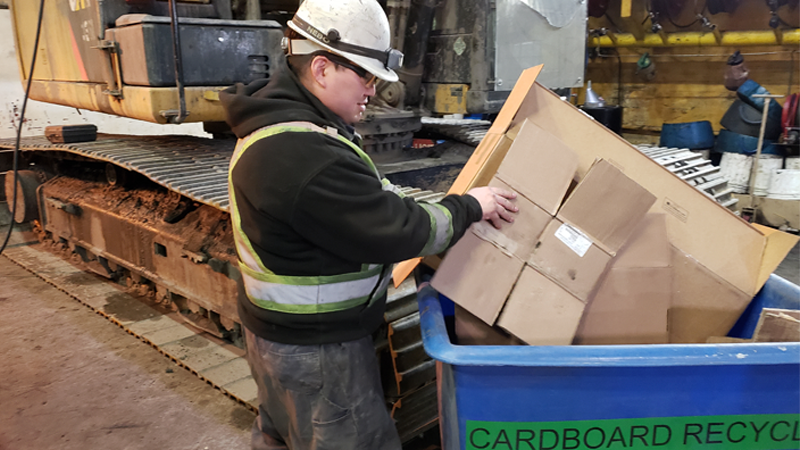When Johanna Salatas arrived at Teck’s Red Dog Operations, she discovered most of her colleagues were concerned about the limited and outdated options available to dispose of waste: burial in the landfill or incineration. Relying on the landfill wasn’t a sustainable long-term option, and incinerating high volumes of trash contributed to greenhouse gas emissions.
In addition, there was the logistical challenge of developing a waste removal and recycling program for a remote site that does not have road access. Barge access was also limited to summer months when the Chukchi Sea thaws enough for shipping.
“Our goal was simple,” says Johanna, acting Environmental Sustainability Coordinator. “We needed to reduce our reliance on incineration while also preserving valuable landfill space. Finding solutions to realize those goals was a much bigger hurdle, given our location 100 miles (161 kilometres) north of the Arctic Circle.”
To get started, Johanna launched a Waste Characterization Study in 2017 to identify the types of waste streams as well as recycling and disposal options for large volumes of waste. This meant combing through the landfill to document and measure various types of garbage, carried out by a team of eight dedicated locally hired people.
The study identified new opportunities for dealing with waste and in some cases, turning it into a source of revenue to help pay for a broader management plan that was developed with Waste Management International, a company that provides industries with recycling solutions. This effort is currently projected to contribute over $500,000 in revenue for what were previously waste materials.
In fall 2018, dedicated shipping container bins were placed around the site to collect a variety of scrap metals, including iron, tin, aluminum, stainless steel, magnesium, scandium and tungsten carbide, which will be shipped off-site and sold for reuse. Next, three full-sized cardboard balers were delivered; the baled cardboard will also be sold for profit. Finally, recycling bins were set up around the site to collect plastic bottles, aluminum cans and plastic shrink wrap. All the waste will be stored and shipped south when the sea thaws and the port opens.
In 2019, a dedicated Red Dog Recycling Centre will open to streamline these recycling efforts; the human power needed to run the program could potentially create new jobs in the region. Johanna is optimistic that the recycling revenue will be used for additional sustainability initiatives at Red Dog Operations.
“We’ve proven that the logistical challenges that come with Red Dog’s remote location can still be solved with sustainable and profitable solutions,” says Johanna.


